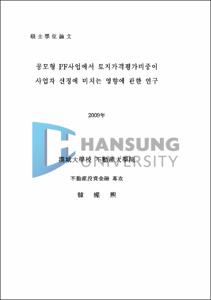공모형 PF사업에서 토지가격평가비중이 사업자 선정에 미치는 영향에 관한 연구
= A Study on the Effects that the Weight of Land Price Assessment Has on the Selection of Constructors for Public-Private Partnership Project Financing Business
- Type
- Thesis
- Advisor
- 이용만
- Department
- 부동산대학원 부동산투자금융전공
- Issued Date
- 2009
- Publisher
- 한성대학교 부동산대학원
- Keyword
- 공모형 PF사업
- Files in This Item:
-
-
Download
 000000358048.pdf
기타 데이터 / 597.84 kB / Adobe PDF
000000358048.pdf
기타 데이터 / 597.84 kB / Adobe PDF
-
Items in Repository are protected by copyright, with all rights reserved, unless otherwise indicated.